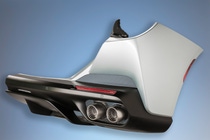Media
Light, thin and extremely robust – Elastolit® makes it possible to use thin lightweight components in vehicles
- Significant weight reduction for body panels with optimized PU-RRIM Composite Elastolit® R 8819 Lightweight
- First components to be used successfully in serial production
- Close cooperation between STR Automotive and BASF key to success
In a joint project, BASF and STR Automotive have brought components for premium vehicles into serial production for the first time using the new material Elastolit® R 8819 Lightweight. In comparison to conventional processing with PU-RRIM materials, the new process convinces due to significant weight reduction. The usual component thickness of 3.0 mm can be reduced to less than 2.5 mm, without detrimental effects on processing, quality or mechanical properties.
Weight reduction with Elastolit®
Front and rear bumpers of small car series are usually produced from polyurethane systems with short-fiber reinforcement (PU-RRIM), with a wall thickness of 3.0 mm. Attempts to lower the weight by reducing the component thickness or using a special filler combination and an associated lower material density failed due to insufficient mechanical properties such as mechanical strength, stiffness and impact strength. This process also could not pass the climate change test.
In an intensive exchange between BASF and STR Automotive, a technological solution to the problem has been found, which is based on a high modulus PU basic material with high temperature resistance, stiffness and very good impact strength.
“The improved performance of the matrix material allows the designer to create a noticeably thinner component, without having to accept limitations in quality”, explains Jürgen Schneider from Technical Development at BASF Polyurethanes GmbH in Lemförde. Depending on the requirements and the application, Elastolit® R 8819 Lightweight can be combined with different filler materials: a mineral standard fiber for components like rear bumpers, a mineral/carbon fiber combination for vertical components with low thermal expansion coefficient (e.g. side panel) or a combination of carbon fibers and light hollow glass spheres for components for which a particularly high weight reduction is a priority.
Working together to achieve success
“A decisive factor for the successful market launch of this new development was the close cooperation with STR Automotive. With this innovative specialist, we have a partner who supports material development at an early stage in existing components and has brought his expertise from component construction and manufacturing”, explains Giuseppe Monaco, Key Account Manager in the Performance Materials department at BASF Italia S.p.A.
In the first serial components made using Elastolit® R 8819 Lightweight, the weight has already been reduced by 600 grams per m² surface area. For rear panels, this means a weight reduction of up to 1.5 kilograms. Dr. Massimo Cecchini, CEO of the company STR Automotive, founded in 2002, is very pleased. “With the new material and the compatible filler options, we have a good set of tools enabling us to satisfy different requirements. For our customers it is important that they get high-quality components. Weight reduction must not be at the expense of quality and there must be balanced price-performance ratio.”
The Italian specialist in trim parts for automotive exteriors and interiors also sees potential for applications arising from the higher temperature stability of the material. This creates additional areas of application for the material, for example in the engine compartment.
Receive the latest press releases from BASF via WhatsApp on your smartphone or tablet. Register for our news service at basf.com/whatsapp-news.
About BASF’s Performance Materials division
BASF’s Performance Materials division encompasses the entire materials’ know-how of BASF regarding innovative, customized plastics under one roof. Globally active in four major industry sectors – transportation, construction, industrial applications and consumer goods – the division has a strong portfolio of products and services combined with a deep understanding of application-oriented system solutions. Key drivers of profitability and growth are our close collaboration with customers and a clear focus on solutions. Strong capabilities in R&D provide the basis to develop innovative products and applications. In 2018, the Performance Materials division achieved global sales of €7.65 bn. More information online: www.plastics.basf.com.
About BASF
At BASF, we create chemistry for a sustainable future. We combine economic success with environmental protection and social responsibility. The approximately 122,000 employees in the BASF Group work on contributing to the success of our customers in nearly all sectors and almost every country in the world. Our portfolio is organized into six segments: Chemicals, Materials, Industrial Solutions, Surface Technologies, Nutrition & Care and Agricultural Solutions. BASF generated sales of around €63 billion in 2018. BASF shares are traded on the stock exchange in Frankfurt (BAS) and as American Depositary Receipts (BASFY) in the U.S. Further information at www.basf.com
P-19-321


